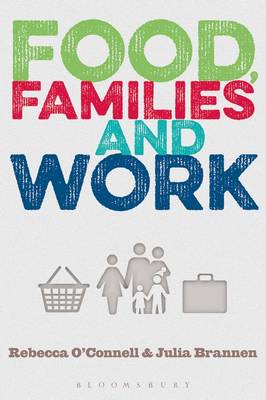15%OFF

Stock image for illustration purposes only - book cover, edition or condition may vary.
Food, Families and Work
Julia Brannen
€ 38.99
€ 33.25
FREE Delivery in Ireland
Description for Food, Families and Work
Paperback. Num Pages: 200 pages, 9 bw illus. BIC Classification: 1DBK; JFCV; JHBK; JHBL. Category: (G) General (US: Trade). Dimension: 158 x 233 x 12. Weight in Grams: 360.
With dual-working households now the norm, Food, Families and Work is the first comprehensive study to explore how families negotiate everyday food practices in the context of paid employment. As the working hours of British parents are among the highest in Europe, the United Kingdom provides a key case study for investigating the relationship between parental employment and family food practices. Focusing on issues such as the gender division of foodwork, the impact of family income on diet, family meals, and the power children wield over the food they eat, the book offers a longitudinal view of family routines. It explores how the everyday meanings of food change as children grow older and negotiate changes in their own lives and those of their family members. Drawing on extensive quantitative data from large-scale surveys of food and diet - as well as qualitative evidence - to emphasise the larger global context of social and economic change and shifting patterns of family life, Rebecca O`Connell and Julia Brannen present a holistic overview of food practices within busy contemporary family lives. Featuring perspectives from both parents and children, this innovative approach to some of the most hotly-debated topics in food studies is a must-read for students and scholars in food studies, sociology, anthropology, nutrition and public health.
Product Details
Publisher
Bloomsbury Publishing PLC
Format
Paperback
Publication date
2016
Condition
New
Number of Pages
200
Place of Publication
London, United Kingdom
ISBN
9780857855084
SKU
V9780857855084
Shipping Time
Usually ships in 5 to 9 working days
Ref
99-1
About Julia Brannen
Rebecca O'Connell is a Senior Research Officer at the Thomas Coram Research Unit, UCL Institute of Education, London, UK. She is co-convenor of the British Sociological Association Food Study Group. Julia Brannen is Professor of Sociology of the Family at the Thomas Coram Research Unit, UCL Institute of Education, London, UK and Adjunct Professor at the University of Bergen, Norway.
Reviews for Food, Families and Work
Brannen and O'Connell have deftly provided a look at how families feed their children. The authors employ an impressive mixed-methods, longitudinal approach that brings refreshing perspective to a global debate often fraught with dramatic pronouncements regarding childhood obesity and the decline of the family meal. A systematic appraisal of dynamic influences including shifting parental employment, domestic foodwork roles, child development, and temporal considerations helps advance an evolving conversation about the family table. The authors skilfully weave rich, evocative case studies into this important contribution to the literature.
David Livert, Pennsylvania State University, USA This book achieves so much, so skilfully; at its heart is a robust analysis of data relating to mothers, fathers and children, drawing on quantitative and qualitative research methods and considering the complex issues of food, families and work over time. It will be of interest to a variety of scholars.
Wendy Wills, University of Hertfordshire, UK By situating children's food in the context of the everyday lives of working families and by considering how children as social agents negotiate their food choices as they move through their lives at home, childcare, and school, O'Connell and Brannen's important contribution illuminates the complexities of food and family life and the dynamic, negotiated practice of children's food in contemporary England.
Roblyn Rawlins, The College of New Rochelle, USA
David Livert, Pennsylvania State University, USA This book achieves so much, so skilfully; at its heart is a robust analysis of data relating to mothers, fathers and children, drawing on quantitative and qualitative research methods and considering the complex issues of food, families and work over time. It will be of interest to a variety of scholars.
Wendy Wills, University of Hertfordshire, UK By situating children's food in the context of the everyday lives of working families and by considering how children as social agents negotiate their food choices as they move through their lives at home, childcare, and school, O'Connell and Brannen's important contribution illuminates the complexities of food and family life and the dynamic, negotiated practice of children's food in contemporary England.
Roblyn Rawlins, The College of New Rochelle, USA
